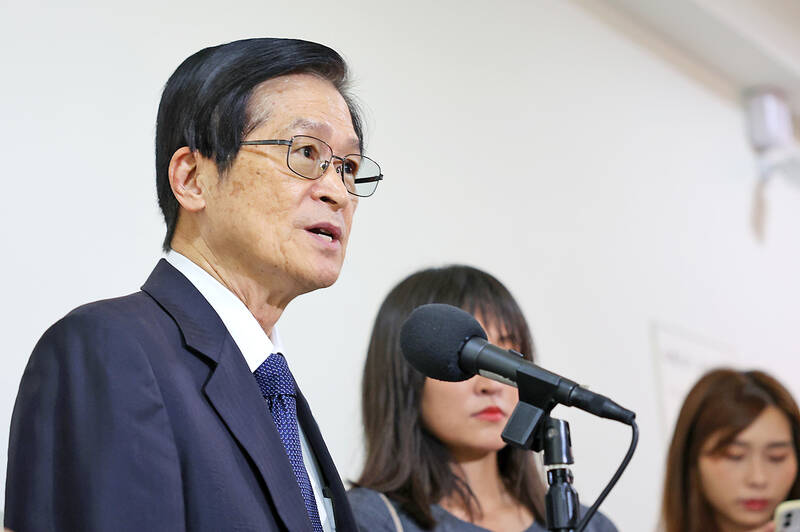Fewer than 100 Republic of China (ROC) veterans are expected to visit China for the Whampoa Military Academy centennial celebrations later this month, Veterans Affairs Council Minister Yen De-fa (嚴德發) said yesterday.
In comparison, more than 10,000 ROC veterans are expected to attend the centennial celebrations at the academy’s current location in Kaohsiung on Saturday and Sunday next week, Yen said.
The minister reminded veterans who plan to visit China for the celebrations in the Huangpu (also known as Whampoa) District in Guangzhou, China — where the academy was founded by the ROC in 1924 — to follow Taiwanese laws while abroad.

Photo: CNA
They are not allowed to participate in media interviews or make political comments while across the Taiwan Strait, and must not jeopardize the nation’s national security and interests, Yen said.
He made the remarks during a legislative session when asked by lawmakers about the council’s stance on the plans of some veterans to visit China for the centennial.
Democratic Progressive Party (DPP) legislators have said that the People’s Republic of China’s invitation to Taiwanese to attend the celebrations in China is politically motivated and aimed at promoting unification.
The academy’s first superintendent was Chiang Kai-shek (蔣介石) who later became ROC president.
At the end of the Chinese Civil War in 1949, the academy relocated to Taiwan with the ROC government. It reopened in 1950 in Kaohsiung under the name the ROC Military Academy.
The original Guangzhou site is now a museum.
Meanwhile, the government has compelled seven service members found guilty of breaching the National Security Act (國家安全法) to pay back their pensions, Yen said.
He made the remarks after DPP Legislator Michelle Lin (林楚茵) asked him for an update on the council’s handling of the matter.
The council in March reported that fourteen retired service members were convicted of national security breaches, and that they collectively owe the government revoked pensions worth NT$45.67 million (US$1.41 million), Lin said.
The council has recovered less than 15 percent of that sum, leaving NT$38.99 million uncollected, she said.
Yen said that the number of convicted personnel has since then increased to 15 and that the council has collected from all but eight of the retired service members.
The Ministry of Justice is now tasked with collection while the council is expected to conduct another audit in the coming months to ensure compliance, he said.
Yen also assured Chinese Nationalist Party (KMT) Legislator Hsu Chiao-hsin (徐巧芯) that the council has no plans to remove statutes and portraits of Chiang from facilities it owns.
Yen on Monday visited an assisted living facility for veterans in Taipei that displayed portraits of Chiang and his last wife, Soong Mayling (宋美齡), which the residents maintain each day, he said.
As many veterans share an inseparable spiritual bond with Chiang, the council would not remove or dispose of his imagery, he said.

‘ABUSE OF POWER’: Lee Chun-yi allegedly used a Control Yuan vehicle to transport his dog to a pet grooming salon and take his wife to restaurants, media reports said Control Yuan Secretary-General Lee Chun-yi (李俊俋) resigned on Sunday night, admitting that he had misused a government vehicle, as reported by the media. Control Yuan Vice President Lee Hung-chun (李鴻鈞) yesterday apologized to the public over the issue. The watchdog body would follow up on similar accusations made by the Chinese Nationalist Party (KMT) and would investigate the alleged misuse of government vehicles by three other Control Yuan members: Su Li-chiung (蘇麗瓊), Lin Yu-jung (林郁容) and Wang Jung-chang (王榮璋), Lee Hung-chun said. Lee Chun-yi in a statement apologized for using a Control Yuan vehicle to transport his dog to a

INDO-PACIFIC REGION: Royal Navy ships exercise the right of freedom of navigation, including in the Taiwan Strait and South China Sea, the UK’s Tony Radakin told a summit Freedom of navigation in the Indo-Pacific region is as important as it is in the English Channel, British Chief of the Defence Staff Admiral Tony Radakin said at a summit in Singapore on Saturday. The remark came as the British Royal Navy’s flagship aircraft carrier, the HMS Prince of Wales, is on an eight-month deployment to the Indo-Pacific region as head of an international carrier strike group. “Upholding the UN Convention on the Law of the Sea, and with it, the principles of the freedom of navigation, in this part of the world matters to us just as it matters in the

BEIJING’S ‘PAWN’: ‘We, as Chinese, should never forget our roots, history, culture,’ Want Want Holdings general manager Tsai Wang-ting said at a summit in China The Mainland Affairs Council (MAC) yesterday condemned Want Want China Times Media Group (旺旺中時媒體集團) for making comments at the Cross-Strait Chinese Culture Summit that it said have damaged Taiwan’s sovereignty, adding that it would investigate if the group had colluded with China in the matter and contravened cross-strait regulations. The council issued a statement after Want Want Holdings (旺旺集團有限公司) general manager Tsai Wang-ting (蔡旺庭), the third son of the group’s founder, Tsai Eng-meng (蔡衍明), said at the summit last week that the group originated in “Chinese Taiwan,” and has developed and prospered in “the motherland.” “We, as Chinese, should never

The High Court yesterday found a New Taipei City woman guilty of charges related to helping Beijing secure surrender agreements from military service members. Lee Huei-hsin (李慧馨) was sentenced to six years and eight months in prison for breaching the National Security Act (國家安全法), making illegal compacts with government employees and bribery, the court said. The verdict is final. Lee, the manager of a temple in the city’s Lujhou District (蘆洲), was accused of arranging for eight service members to make surrender pledges to the Chinese People’s Liberation Army in exchange for money, the court said. The pledges, which required them to provide identification